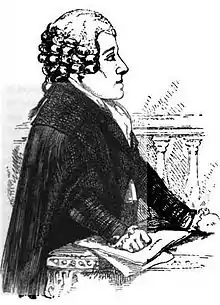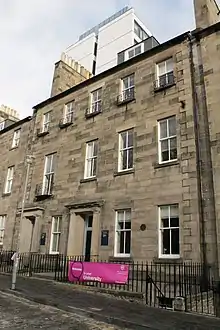Robert Dundas of Arniston
Robert Dundas of Arniston (6 June 1758 – 17 June 1819) was a Scottish judge.
Robert Dundas of Arniston | |
|---|---|
 | |
| Chief Baron of the Exchequer | |
| In office 1801–1819 | |
| Monarch | George III |
| Preceded by | Sir James Montgomery |
| Succeeded by | Sir Samuel Shepherd |
| Personal details | |
| Born | 6 June 1758 |
| Died | 17 June 1819 (aged 61) |
| Nationality | British |
| Alma mater | University of Edinburgh |

Dundas served as Solicitor General for Scotland between 1784 and 1789 and as Lord Advocate from 1789 to 1801. He sat as Member of Parliament for was M.P. for Edinburghshire from 1790 to 1801, and was Chief Baron of the Exchequer in Scotland from 1801 until his death in 1819.
Life
Robert was born 6 June 1758. He was the eldest son of Robert Dundas of Arniston, the younger and his second wife, Jean, daughter of William Grant, Lord Prestongrange. He was educated at the high school and the University of Edinburgh, and was admitted advocate in 1779. (Hamilton 1888, p. 195)[1]
With the help of his uncle Henry Dundas, 1st Viscount Melville he succeeded Alexander Wight as Solicitor General for Scotland in 1784 and became lord advocate in 1789. At this time he was living at Adam Square near Greyfriars Kirk.[2]
From 1790 to 1801 he was MP for Edinburghshire.
In June 1792 he was the cause and focus of the Dundas Riots, starting at his home in George Square.[3] Following the riots he made it a personal aim to prosecute and effectively destroy the Edinburgh lawyer, Thomas Muir of Huntershill, who he saw as responsible for most of the seditious mischief.[4]
He appeared for the crown in the great prosecutions for sedition at Edinburgh in 1793. In 1796 he was elected Dean of the Faculty of Advocates.[5]
He was joint-clerk and keeper of the general registers for seisins and other writs in Scotland from 1799 until on 1 June 1801 he was appointed chief baron of the exchequer in Scotland, but in 1801 and 1811 he turned down offers of the lord presidency.
He died at his townhouse, 57 George Square, Edinburgh[6] on 17 June 1819.[7][8][1]
Family
Part of a Scottish legal and political dynasty, Dundas was the son of Robert Dundas, of Arniston, the younger. His great-great-grandfather James Dundas, Lord Arniston (died 1679) and great-grandfather Robert Dundas, Lord Arniston had been MPs and judges, as were his grandfather Robert Dundas, of Arniston, the elder and his father Robert Dundas, of Arniston, the younger.
In May 1787 Robert Dundas married his first cousin, Elizabeth Dundas, daughter of his uncle Henry Dundas. Together they had two daughters and three sons. Elizabeth died 18 March 1852. His heir, Robert, who lived at 69 Queen Street in Edinburgh,[9] died in 1838. Henry, the second son, was vice-admiral in the navy, and died 11 September 1863.[8][7] His daughter married John Borthwick of Crookston FRSE (1787–1845).[10]
Notes
- Hamilton & Fry 2004.
- Edinburgh Post Office Directory 1784
- Grants Old and New Edinburgh
- House of Commons: Robert Dundas of Arniston
- Henry Dundas Viscount Melville. p. 63.
- Edinburgh Post Office Directory 1819
- Hamilton 1888, p. 195.
- His portrait appears in Kay's Edinburgh Portraits. (Hamilton 1888, p. 195)
- "Edinburgh Post Office annual directory, 1832-1833". National Library of Scotland. p. 56. Retrieved 18 February 2018.
- http://www.royalsoced.org.uk/cms/files/fellows/biographical_index/fells_indexp1.pdf
References
- Hamilton, J. A.; Fry, Michael (reviewer) (2004). "Dundas, Robert, of Arniston (1713–1787)". Oxford Dictionary of National Biography. Oxford University Press. doi:10.1093/ref:odnb/8258.
- Attribution
 This article incorporates text from a publication now in the public domain: Hamilton, J. A. (1888). "Dundas, Robert (1713-1787)". In Stephen, Leslie (ed.). Dictionary of National Biography. 16. London: Smith, Elder & Co. p. 195.
This article incorporates text from a publication now in the public domain: Hamilton, J. A. (1888). "Dundas, Robert (1713-1787)". In Stephen, Leslie (ed.). Dictionary of National Biography. 16. London: Smith, Elder & Co. p. 195.
External links
| Parliament of Great Britain | ||
|---|---|---|
| Preceded by Henry Dundas |
Member of Parliament for Midlothian 1790–1801 |
Succeeded by Parliament of the United Kingdom |
| Parliament of the United Kingdom | ||
| Preceded by Parliament of Great Britain |
Member of Parliament for Midlothian 1801 |
Succeeded by Robert Dundas |
| Legal offices | ||
| Preceded by Alexander Wight |
Solicitor General for Scotland 1784–1789 |
Succeeded by Robert Blair |
| Preceded by Ilay Campbell |
Lord Advocate 1789–1801 |
Succeeded by Charles Hope |
| Preceded by Sir James Montgomery |
Chief Baron of the Exchequer 1801–1819 |
Succeeded by Sir Samuel Shepherd |
| Academic offices | ||
| Preceded by Lord Craig |
Rector of the University of Glasgow 1803–1805 |
Succeeded by Henry Glassford of Dugalston |